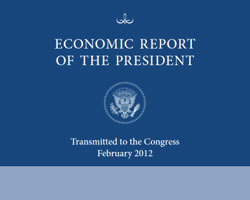Sharing Economic Realities and Expertise: MSU Professor Spends Valuable Year at the White House with the Council of Economic Advisers
- Lisa. D. Cook, Ph.D.
- Assistant Professor of Economics and International Relations
- James Madison College
One of the most expansive professional development experiences for an economist is to advise the President of the United States. Lisa Cook had that opportunity recently, serving as a senior economist at the Council of Economic Advisers. During the year-long appointment she focused on the euro zone, macroeconomics, technology and innovation, and entrepreneurship.
The Council is an agency within the Executive Office. It was established by Congress in the Employment Act of 1946 and is responsible for analyzing and interpreting economic developments, recommending national economic policy, and assisting the President in the preparation of the annual Economic Report of the President.
It is not the first time Cook has interrupted her research to serve the federal government. She was a senior adviser on finance and development with the Council on Foreign Relations in the Treasury Department in 2000 and 2001, serving with the Clinton and Bush Administrations. She also served as a team leader on economics and international trade for President Obama during the presidential transition from November 2008 to January 2009.
In between government assignments Cook was a visiting professor at Harvard's Kennedy School of Government, deputy director of Africa research at Harvard Kennedy School's Center for International Development, and a national fellow at Stanford University.
Cook earned B.A. degrees in philosophy from Spelman College in Atlanta, Georgia and Oxford University in England as a Marshall Scholar. She wrote a master's thesis at the Université Cheikh Anta Diop de Dakar in Senegal, and she received her Ph.D. in economics from the University of California, Berkeley in 1997.
She came to Michigan State University in 2005, in part to focus her research on the economic impacts of intellectual property. MSU's progressive approach to tech transfer and abundant portfolio of intellectual property, including patents, appealed to her and fit into long-term research goals.
With research projects in banking, financial, and economic crises, in both domestic and international contexts; patents and scientific networks; and economic growth and development, Cook has a full academic plate.
"The biggest problems deserve the best research. Many economists feel that their research is not included in formulating public policy, and that if the research was better incorporated into overall decision-making it could provide more effective policies."
Dr. Lisa Cook
Cook brought a broad range of research expertise to the senior economist position on the Council of Economic Advisers. "Historical data provides answers to contemporary economic policy questions," says Cook. "Economists work with data that are often available months after the fact, so it is a lengthy process to determine trends and outcomes and implement new policies that correct course."
One of the hallmarks of the experience for any economist serving on the Council is the breadth and depth of data available for analysis. "There was access to any number of data sets. The economists collect, analyze, and interpret data from a vast array of sources. We then critically evaluate the economic case for different policy recommendations. The president relies on sound advice from the Council so it is critical that we have a comprehensive understanding of any and all available data and empirical evidence," Cooks says.
Serving on the Council of Economic Advisers provided Cook with an opportunity to make the case that there is a link between small business success and the national economic recovery. She points to evidence that economic policies that benefit small and new businesses help generate economic and financial stability in key manufacturing states, like Michigan and Ohio.

Economic Report of the President
Cook maintains that small businesses, particularly those in manufacturing, were disproportionately affected by the economic crisis and points to Chapter Two of the 2012 Economic Report regarding manufacturing's significance: "The manufacturing sector has been growing faster than the rest of the economy during the recovery, with real output rising at an average annual rate of 5.7 percent since its low in June of 2009—its fastest pace of growth in a decade. The rise in manufacturing output during the recovery has provided a considerable boost to the U.S. economy."[1] As a specific example, from her research on the Council, she found that the 2009 bailout of auto parts suppliers, which are overwhelmingly small businesses, was critical in saving the auto industry itself.
The year-long assignment on the Council of Economic Advisers has affected Cook's approach to her research and teaching now that she has returned to MSU. "I definitely infuse my courses now with knowledge from the White House experience. It is the center of economic policy-making, and I have a much better grasp of that process and what it takes to implement measures that strengthen the economy," she says.
"The biggest problems deserve the best research. Many economists feel that their research is not included in formulating public policy, and that if the research was better incorporated into overall decision-making it could provide more effective policies." Her research has been affected due to the number of new ideas generated by the multitude of new research and policy problems she encountered and by the vast amount of new research she read in connection with her assignment.
"It was a very rewarding experience, and I am honored to have contributed to our country's national economic policy," says Cook. "I must say I also experienced a very happy moment when I turned in my government issued Blackberry and could return to MSU and claim a modest measure of control over my own schedule once again."
- Written by Carla Hills, University Outreach and Engagement
- Photographs courtesy of MSU Communications and Brand Strategy